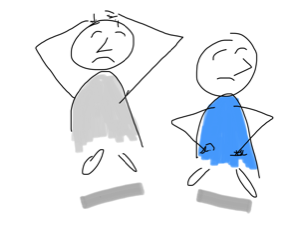Why Divorce and Culture Shock Among Syrian Refugees in The Netherlands Should Interest You
Authors: Mohammed Nour al Naimi and Lin McDevitt-Pugh[1]
According to a researcher quoted in the Dutch newspaper De Volkskrant, fifty percent of Syrian couples in the Netherlands contemplate divorce, and many do divorce.[2] While we cannot say whether this is true or not, we know that the numbers are high. Yet for people in the Arab world, divorce is the most abhorred, last possible solution to a marriage which suffers from incurable problems. The Prophet Mohamed says: “Allah did not make anything lawful more abominable to Him than divorce.” [3]
The trauma of divorce is an extra strain on the efforts of Syrians to adapt to their new country.
Understanding the context of divorce for the Syrian community is crucial for Dutch social workers, case managers and others working to support Syrians in the Netherlands.
In this article we will explore the question of divorce among Syrian refugees in the Netherlands. Before approaching this question in detail, it is important to note that divorce was taking place in Syrian courts as a part of everyday life before the war. However, even in the capital Damascus it was not uncommon for courts to ignore petitions for divorce. [4] What is, to some, shocking and abnormal, is the large increase in the numbers of divorces taking place during the war and its aftermath. [5]
No refugee is ready for the culture shock of moving to the Netherlands, where women have freedom and men discover a legal disdain of their normal patriarchal world view. Within this culture shock, some forms of marriage are more vulnerable to divorce than others. So how does culture shock affect marriages? Co-author Nour Naimi is a cultural bridge-builder in the city of Zaanstad. He sees a lot – and has advice for Dutch organisations set up to support Syrian refugees as they contemplate and go through divorce.
Forms of Syrian Marriages that are Most Vulnerable to Divorce in the Netherlands
Although any marriage could potentially end in divorce, there are four characteristic marriages that have an inherent source of conflict and can more easily result in divorce.
- An old, rich man marries a young, poor woman. In Syria, such marriages are accepted as a solution to poverty;
- To keep wealth inside the family, relatives force a female member of the family to marry a male member of the family. This sort of marriage is sometimes called an “arranged (or traditional) marriage”;
- A man and a woman who come from different ethnic or educational backgrounds (educated vs uneducated), subcultural (Arabs vs Circassian) or even religious (Arab Muslims vs Armenians or Christians) or demographic (the countryside vs the city);
- The marriage of people belonging to two different sects among one sort of religion (be it Sunni, Shia, Druze, Alawait, as well as Catholic vs Protestant, for example).
Divorce in the Arab World
When a marriage ends in divorce, the woman pays the heaviest price. She is stigmatised, feared, silenced and secluded from the rest of the society. The men resume their lives as if nothing has happened. They often find a younger woman to marry and establish a new family. According to Sharia law, if a divorced woman remarries, she loses guardianship of her children. The jointly accumulated capital usually remains with the man.
To understand the issues relating to divorce among Syrians in the Netherlands, let us shed some light on the cause of the stigma, fear and seclusion that women divorcees face in the Arab countries.
- It is a stigma for an Arab woman to be divorced in the Middle East because if the divorcee returns to her father’s house, she becomes a servant to her old parents. If she returns to her brothers’ home, her brother’s wife sees her as (and lets her know that she is) an unwanted financial burden.
- After returning to her family’s house as a divorcee, she may no longer pay social visits with her family to other families. If she would do so, she would be looked at with suspicion, feared by other wives as a threat and as a source of temptation. Their concern is that she will steal someone else’s husband. This explains why she is avoided socially and ends up in social isolation.
- Even if the divorcee has a job and she is financially independent, she cannot travel or live in a house of her own alone. She would be viewed with suspicion and her family fears she would meet a man illicitly, a thing that would stain the family’s honour.
- As a result, no matter how much discomfort some women experience in their marriage, they ‘swallow’, accept and/or ignore all or most of the injustices inflicted on them by their husbands and other male members of their families. This situation gives the husbands the freedom to be womanisers, adulterous, drinkers, gamblers, and living, where relevant, on the salaries of their wives. In such a male-chauvinistic, patriarchal society, wives feel obliged to keep silent, for fear of scandal and of losing the financial support (if she is not the provider), shame, and maintaining the family honour.
Divorce and Culture Shock
When they arrive in the Netherlands, Syrian married couples notice the absence of the old culture and norms; these cultures and norms are, for the Syrian woman, no longer to be feared. The possibility of getting a divorce starts to become real for Syrian (and Arab) women in general, when they arrive in Europe and begin to understand and appreciate Western culture and its positive attitude towards women as being free and equal to men. The idea of divorce is welcomed as bearing less stigma, and safer. [6]
Nevertheless, both men and women experience culture shock.
Culture shock has been defined as “a feeling of anxiety, loneliness, and confusion”. [7] It “is an experience a person may have when one moves to a cultural environment which is different from one’s own; it is also the personal disorientation a person may feel when experiencing an unfamiliar way of life due to immigration … to a new country, a move between social environments, or simply transition to another type of life.”[8]
The Merriam Webster Dictionary defines culture shock as “a sense of confusion and uncertainty”, “sometimes with feelings of anxiety that may affect people exposed to an alien culture or environment without adequate preparation.” [9]
Four phases of culture shock
Syrians, men and women, fleeing to Western Europe and taking shelter in one of its countries, are generally happy upon their arrival and during the early period of their residence, as though it were a honeymoon. This coincides with one (or the first) of the four critical stages of a culture shock cycle identified by the anthropologist Kalervo Oberg. [10] Oberg identified four distinct phases of culture shock:
- Honeymoon phase;
- Crisis phase;
- Recovery phase;
- Adjustment phase.
Happiness
During the first phase of their stay in the Netherlands, Syrian men and women are happy, not only because of their “romantic” view [11] of the new Western life and culture they find themselves and their families in, but also because they are received, after a relatively short period, in an “… environment with… adequate preparation”,[12] which includes safety, warm houses, reasonable financial monthly support and health care.
However, Syrian women are even happier than their husbands, as they began to discover their legal rights which include being equal to their husbands, and the potential freedom to be financially independent. Many realise they no longer have to continue accepting the psychological and physical violence inflicted on them by their husbands. They learn that the court can force their husbands to leave the home. They start to acquire the confidence and strength to divorce their husbands.
Crisis
For some Syrian men, the culture shock is difficult and painful. This marks the second stage of culture shock, the crisis phase. Gender roles and the family life they knew has changed. Men lose their authority over women who are no longer diffident, submissive and subdued. The contrast with the patriarchal society they knew and enjoyed in Syria is sharp. They are no longer appreciated for being macho or the master. They are no longer free to threaten and silence women. Men view the law in European society as anti-male and pro-female, and as such view the new freedom of their wives as a form of “revenge” against the accumulated injustices inflicted on them. This, exacerbated by their failure to master and speak the language and to find a suitable job equal or similar to their previous jobs, catapults them into a crisis. Lawyers, judges, teachers and people with a Ph.D find this new imbalance particularly difficult.
The various symptoms of the crisis phase which aggravated the Syrian husbands in their new environment can be seen in the mixture of the following feelings:
- Loss of self-confidence, loneliness and inner sadness due to loss of authority;
- Fear of going outside due to inner shame and anxiety because of the changing of gender roles and family type of life;
- Feelings of failure and frustration (being not able to find a suitable job);
- Being always misunderstood (for not being able to learn the language);
- Developing negative views and attitudes towards their new life;
- Extreme homesickness and a desire to return home. [13]
Syrian men come to see the law in the West as being on the side of women only. The law itself becomes an enemy, an enemy that has transformed them from “machos and masters” into “sheep”.[14] Fathers become anxious and concerned for the future of their ability to raise the children in this European cultural context of what they see as excessive freedom. They worry about losing their parental authority in the face of the social dangers of drugs, smoking and alcohol drinking. They find it difficult to comprehend the law and the resulting legal restrictions (sometimes even prison sentences) stopping them from seeing their children after a legal separation or divorce. Some become homeless.
When divorce takes place, a great culture shock hits many husbands, making them realize that something is not right. They feel disenchanted with their new country. Some refugees threaten to go back to their previous country or to a country close to it. This threat is a “… prelude to a fully-fledged nervous breakdown.” [15]
Recovery an adjustment phases
The third and fourth phases of culture shock are recovery and adjustment. After a difficult period, some men attempt to adapt to the new values and to construct a new identity in the country they now call home. They manage to decode the codes of the new culture, customs and habits, making friends among the expatriates and then among the locals. They improve their ability to communicate using the new language and look for a job that could raise their standard of living. Slowly they try to rid themselves of their disenchantment and feeling of being cheated, with or without success. If they are successful, they begin to believe they can recover and adjust.
Exploding time-bombs
The three elements of culture, tradition and religion in Syria combine to provide women with few alternatives to staying married. Once removed from these elements and their impact on each other, the marriages are time-bombs ready to explode at any moment.
For many Syrian women, the moment for the time-bomb to explode comes when their life as refugees begins and they encounter new cultures. Why is this the right moment? Women find themselves living under new conditions. Socially, legally and financially, they feel supported. They observe that their new country promotes real equality and freedom. They develop a new understanding of cultures, and the new culture gives them the opportunity to face, challenge and change the unspoken problems in their countries of origin. Now they are free to question:
- Psychological and physical violence inflicted on them by their husbands or other male figures of their families;
- The fear of ‘shame’ imposed on them by their society – a thing which paralyzed them;
- Financial dependence on their family male members;
- The feeling of inferiority in comparison to the feelings of superiority of the male figures;
- Their attitude towards tattered old customs and beliefs, such as the idea of the divorcee as a temptress, and as a husband-snatcher.
Six Typical Scenarios for Divorce among Syrians in the Netherlands
In his capacity as a cultural bridge-builder between Syrian refugees and Dutch society, Nour has discovered six typical divorce scenarios for Syrians in The Netherlands.
1. Women who escaped poverty
We referred earlier of the marriage between poor Syrian women and older men who are rich. The woman’s family sees this as a good solution: it is a way for the woman to have financial security. For the woman herself, the choice is simple: if she does not marry, she will either become a semi-slave to her sister-in-law or another family member.
It is very likely that the husband in this case will be the kind of husband that is seen as normal in the Arab world: sexist and chauvinist, a product of the patriarchal society. He assumes the role of master. It is expected that the wife plays her assigned role, that of a follower. As would be the case in the Netherlands, this is not a recipe for a happy marriage. However, if she were to ask for a divorce in Syria, the almost certain future is slavery and exploitation. This is especially so if she is from the countryside. She would leave the husband’s house only to become a burden once again on her poor parents or enslaved by the brothers’ wives or exploited by their boss if they find work.
Nour has seen such couples arrive in the Netherlands, get assigned to a house and a city, and both receive social security benefits. This is the moment that the luck of both changes. The man who once owned a factory or a company is no longer rich. He lost everything in the war. The wife now has an independent source of income through social security benefits. She has arrived in a country where, by law, she has a freedom of choice. This freedom was financially and socially impossible in Syria. She can choose to divorce the husband without the risk of social stigmatization. The Dutch will not see her as available for “illicit” relationships, she probably has no male members of the family nearby to guard her “correct” behaviour. She feels equal, free and has no need to remain married.
2. Women who want to support family elsewhere
Many of the women Nour has met have never worked for a salary and have never had money of their own. When they arrive in the Netherlands, they realise that it is possible to become independent of their husbands. They receive social security and there is an additional fund available for the children. Having access to finances and knowing that their family members back in Syria or in another place need financial support, they want control over their income. If the husband resists, they are happy to go to court and ask for a divorce. Some husbands experience this as their wives sacrificing their family life for financial freedom.
3. Friends encourage women to experience freedom
Women who are unhappily married arrive in the Netherlands and meet other women who are happy with their freedom to rid themselves of their husbands. The first phase of culture shock is very freeing. They discover that it is possible to divorce. They see that they would not face the social isolation that they would in Syria. The encouragement from other women plays a crucial role in breaking the ice in these already unequal and unstable marriages. In some cases, new male friends may attempt to exploit the situation by having a relationship with her. Such a topsy-turvy situation frustrates the husband and deepens his psychological crisis. He enters the second phase of the culture shock.
4. Presence of the fear of honour crimes
Some women in the Arab world, particularly in Jordan and the Syrian desert, live in constant fear of honour crimes. These despicable acts are sometimes called shame killing or honour defence. Honour crimes have become very rare in Syria, but still occur frequently in Jordan. The very thought of honour killing still remains a built-in fear in the consciousness, something that terrifies women with a traditional cultural Arab, Muslim origin, all over the world.
Even when innocent, male family members can decide to murder the women, simply on the basis of a rumour. In the Netherlands the women discover they no longer have to fear being a victim of an honour crime. Theychoose to divorce the man they married against their will.
5. A husband who mismanages family finances
One of the less common circumstances leading to divorce and which Nour witnessed during in the course of his work with the Syrians in the Netherlands is the failure of some husbands to manage the financial affairs of their families. Despite the fact that behave well towards their wives and children, In the new country they do not feel the need to pay the rent, gas and electricity, and even the health insurance. Their debt, as a result, is accumulated endlessly and finally they (with their wives) are dragged into courts. This scandalous behaviour is the root of the wife’s request for separation and divorce.
6. Whose money is it anyway?
The dowry, or bride price, is a source of contention within the marriage. Not common in the cities, families in the countryside and on the outskirts of cities ask a high bride price. The daughter receives almost none of this dowry. The resulting tensions between the daughter and her new family can result in the wife wanting a divorce. Once she arrives in the Netherlands, she asks for a divorce. The practice still continues in The Netherlands. Nour sees families wanting to exact a high price for their daughters. When unsuccessful, the daughter, according to traditional values, is unable to marry.
The Importance of Building New Networks
It is crucial for the Syrian refugees to build networks, and to be supported in doing so. New networks are key to solving many of the problems that the newly arrived Syrians face. Networks provide trusted, responsible mediators as advisors. Networks also enable Syrian newcomers to understand the mechanisms of how the country they now call home work, its people, its language and culture. This supports them in dealing with the problems they could face, such as divorce and integration, possibly to the extent that the marriage could become viable again. Supporting Syrians in building their networks should be a continuous, ongoing process.
Network experts, case managers, contact persons and social workers in Dutch municipalities, the refugee camps and other organisations, have an essential role to play in supporting the refugees during such a thorny process. They can listen, understand and provide opportunities for the newcomers to engage in a meaningful way with others in their new country. They can help them learn the new language and find work. Such specialized, efficient, and caring people can connect refugees and enable them to establish their network. This helps them gain the necessary support to address their specific needs, helping them to feel at home. Most importantly, such specialized experts can help the newcomers understand that this culture shock is a normal phenomenon, and that it is temporary: how quickly they are able to pass through this ordeal depends on themselves, and how they build and create their new network. If the social circumstances, such as finding employment, housing and mastering the language, are achieved as quickly as possible, the newcomers will be able to move into a new phase of bridging the life they had in the old country and the opportunities in the new country.
Since ancient time, Syrians have been known as a nation of traders. Once they are able to integrate the new culture into their everyday lives, they will be an asset to the Netherlands – forming a bridge between the Arab would and the Netherlands. New networks can be formed and new bridges can be created – and Dutch professionals play a key role in making this happen.
In closing
Traditional Syrian marriages do not fare well in the Netherlands. Men and women, as well as their sons and daughters, have to find a way to survive in the tumult of the conflicting cultures. Their voyage to the Netherlands is simultaneously a voyage from a patriarchal, tribal culture to a culture that espouses equality and empowerment. In this voyage, both partners, and their children, deserve all the care and respect the Netherlands has to offer.
Zaanstad, 20 July 2020
================
[1] M. Nour Al Naimi (Ph.D. Essex, England) has been an assistant professor in Syria, Jordan, Saudi Arabia and Lebanon. He taught Modern English Literature, comparative literature, cross-cultural studies and orientalism. In the Netherlands he continue this work, in a way. He is now a cultural advisor, teaching newly arrived Arabic-speakers the differences and similarities between the Arabic and Dutch cultures. He also works with municipalities and other organizations to help them discover the differences and similarities between their culture and that of Arabic-speaking newcomers.
Lin McDevitt-Pugh (MBA) is an award-winning writer and expert in building and using networks as resources. Not for personal wealth: her vision is that people with valuable ambitions work together, to empower each other and to empower society. Her clients include the World Bank, municipalities, schools, universities, businesses and non-profit organisations world wide. Read her book in networking is available in Dutch, English and Spanish. https://netsheila.com/bestel-lins-boeken/
Lin and Nour provide workshops for all new arrivals to the Netherlands in a number of Dutch municipalities. They do this as part of the municipality’s Participatie Verklaringstraject, which is a mandatory first step towards getting a permanent staying permit. As part of this offering, Nour and Lin teach the newcomers networking skills. Many participants acknowledge their thanks for our support in dealing with divorce.
[2] M. Uildriks, 2019: “Voor veel Syrische vrouwen voelt de komst naar Nederland als een bevrijding van onderdrukking”, De Volkskrant, 22 februari 2019.
Sunnah.com, Book of Divorce (Kitab Al-Talaq): cited in https://sunnah.com/abudawud/13
[3] Sunnah.com, Book of Divorce (Kitab Al-Talaq): cited in https://sunnah.com/abudawud/13
[4] Uildriks, 2019, ibid.
[5] For this shift, see “The phenomenon of divorce is deepening … Chaos is breaking up Syrian families” in Geiron: Syria which resembles us (in Arabic), 30 April 2020. https://geiroon.net/archives/114194
[6] In this article, we deal with the most urgent and painful aspects of culture shock on the Syrian refugees, the first stages. It is too early to deal with its last stages, such as the recovery and adjustment phases of culture shock.
[7] Collins Cobuild Dictionary on CD-ROM 2006.
[8] Macionis, John, and Linda Gerber. “Chapter 3 – Culture.” Sociology. 7th edition ed. Toronto, in: Pearson Canada Inc., 2010. 54. Print, cited in Wikipedia online. https://en.wikipedia.org/wiki/Culture_shock.
[9] See: https://www.merriam-webster.com/dictionary/culture%20shock
[10] Oberg, K. (1960). “Cultural Shock: Adjustment to New Cultural Environments”. Practical Anthropology, 7, 177-182. Cited in https://en.wikipedia.org/wiki/Culture_shock
[11] Oberg, K. says that “During this period, the differences between the old and new culture are seen in a romantic light. In moving to a new country, an individual might love the new food, the pace of life, the locals’ habits. During the first few weeks, most people are fascinated by the new culture. They associate with nationals who speak their language, and who are polite to the foreigners. Like most honeymoon periods, this stage eventually ends” [Italics are mine]. https://en.wikipedia.org/wiki/Culture_shock
[12] The Merriam Webster Dictionary defines culture shock as “a sense of confusion and uncertainty sometimes with feelings of anxiety that may affect people exposed to an alien culture or environment without adequate preparation”. Much, but not all, of the pain of culture shock was spared Syrian refugees by the “adequate preparations” provided. They were given a home and an income.
[13] InternationalRelationsEdu.org defines seven symptoms of Culture Shock and Wiki-Voyage defines 10 symptoms of culture shock.
[14] @jaafarAbdulKari Jaffar Talk, Syrian Refugee Women Decided to Divorce
[15] Culture shock, The Insiders’ Guide to Expatriate Health, https://expathealth.org/health-advice/the-four-phases-of culture-shock/
Our clients



















